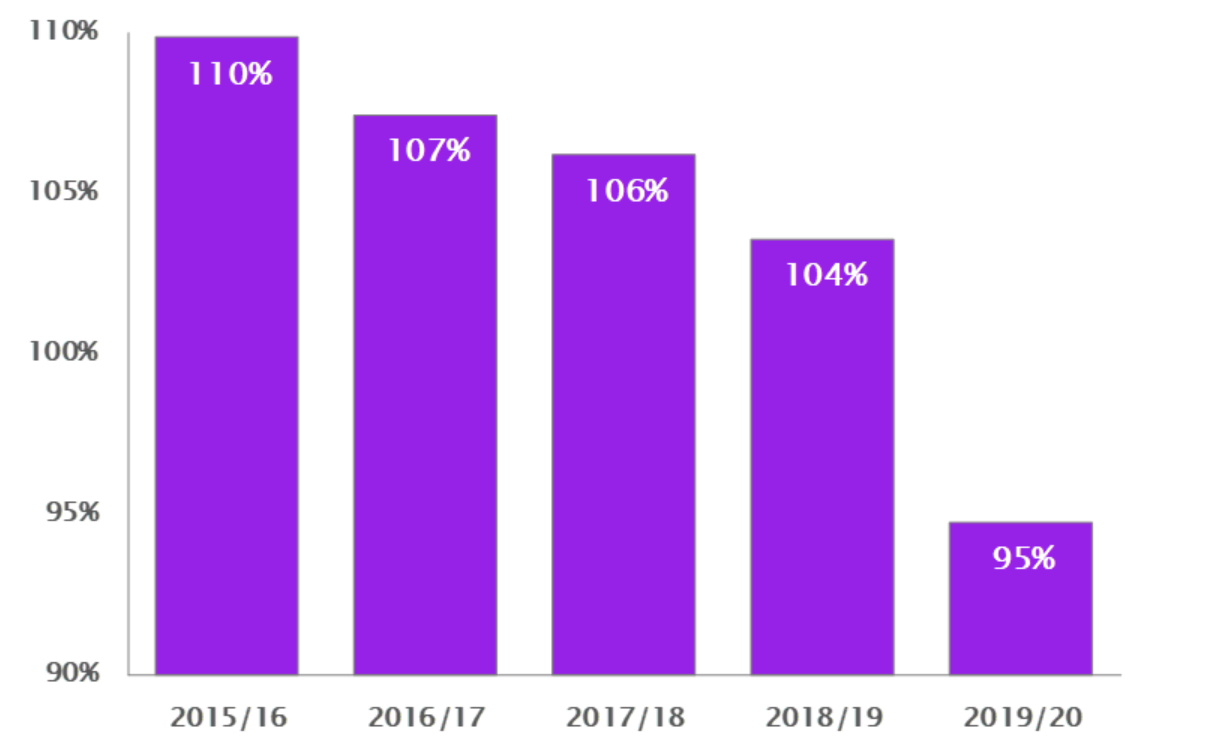Publications featured in include: Daily Express, City AM, The Scotsman, Leicestershire Live and Nottinghamshire Live
- SMEs now have just 95% of the cash needed to pay upcoming debts
- Coronavirus pandemic likely to worsen cash problems for SMEs
Our research shows that the average UK SME does not have enough cash to cover debts due in the next year.
Our analysis of the balance sheets of more than 13,500 SMEs in the UK shows that the average SME now has only 95% of the cash (or other easily realisable assets) to pay those debts due in the next 12 months.
The ability to pay short-term debts out of cash or other short-term assets is seen as a key indicator of business health, especially in periods of financial stress such as the current Coronavirus crisis.
With the Coronavirus pandemic forcing many small businesses to temporarily close their doors or reduce sales, the cash flow crunch for the UK’s SMEs is only likely to get worse in the coming months.
UK SMEs’ cash-to-debt ratio has already been declining for several years in a row, culminating in average cash reserves falling from 104% to 95% of short-term debts in the past year alone (see graph below). This may reflect more challenging trading conditions for SMEs in the wake of the Brexit vote.
The problem could be made worse if larger businesses slow their payment of invoices to their smaller suppliers. In recent days a number of large, well-capitalised multinationals have suggested that they will not pay their landlords.
The figures highlight the importance of the £330bn package of lending support for small businesses announced by Chancellor Rishi Sunak in mid-March. To pay debts coming due, many SMEs will need to access borrowing or raise additional capital from shareholders. The alternative, of cutting spending faster than sales decline, may help accelerate the shrinking of the economy.
Our research shows that it is vital that these loans to support small businesses – known as Coronavirus Business Interruptions Loans (CBIL) – are made available to SMEs as quickly and seamlessly as possible.
CBIL will support SMEs with access to loans, overdrafts, invoice finance and asset finance of up to £5 million for up to six years. Interest will be covered by the Government for the first 12 months of the loan. Business are eligible for the scheme if they are UK based, with turnover of no more than £45 million per year.
The loans will be provided by the British Business Bank through high street banks and other lenders, although there has been some confusion over what interest rates will be charged and whether they will require personal guarantees from directors.
Martin Jones, partner in our London office says: “It’s worrying to see British SMEs are struggling to pay their short-term debts already – Coronavirus disruption is going to make the situation even worse over the coming weeks and months.
A lot of SMEs have seen their incomes drop precipitously almost overnight. Cost-cutting isn’t going to fix the problem – many will need emergency support from the Government as well as swifter payments from their debtors to make it through this crisis.
It’s crucial that Coronavirus Business Interruptions Loans are made available to businesses as fast as possible, with the minimum of bureaucracy and red tape. Banks often want to process SME loans through a lengthy underwriting process, but this situation is unprecedented. A huge volume of lending needs to get to UK small businesses in days, not weeks or months.”
Average UK SME now has just 95% of the cash needed to pay upcoming debt



